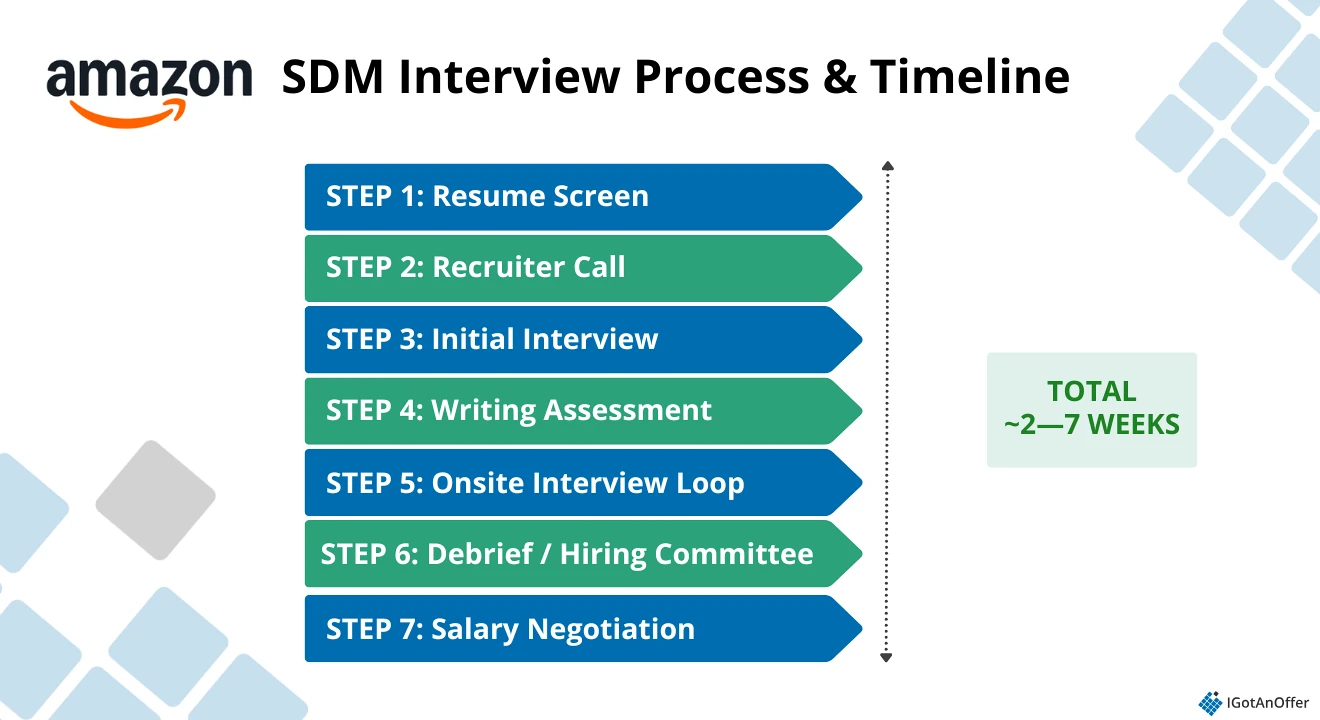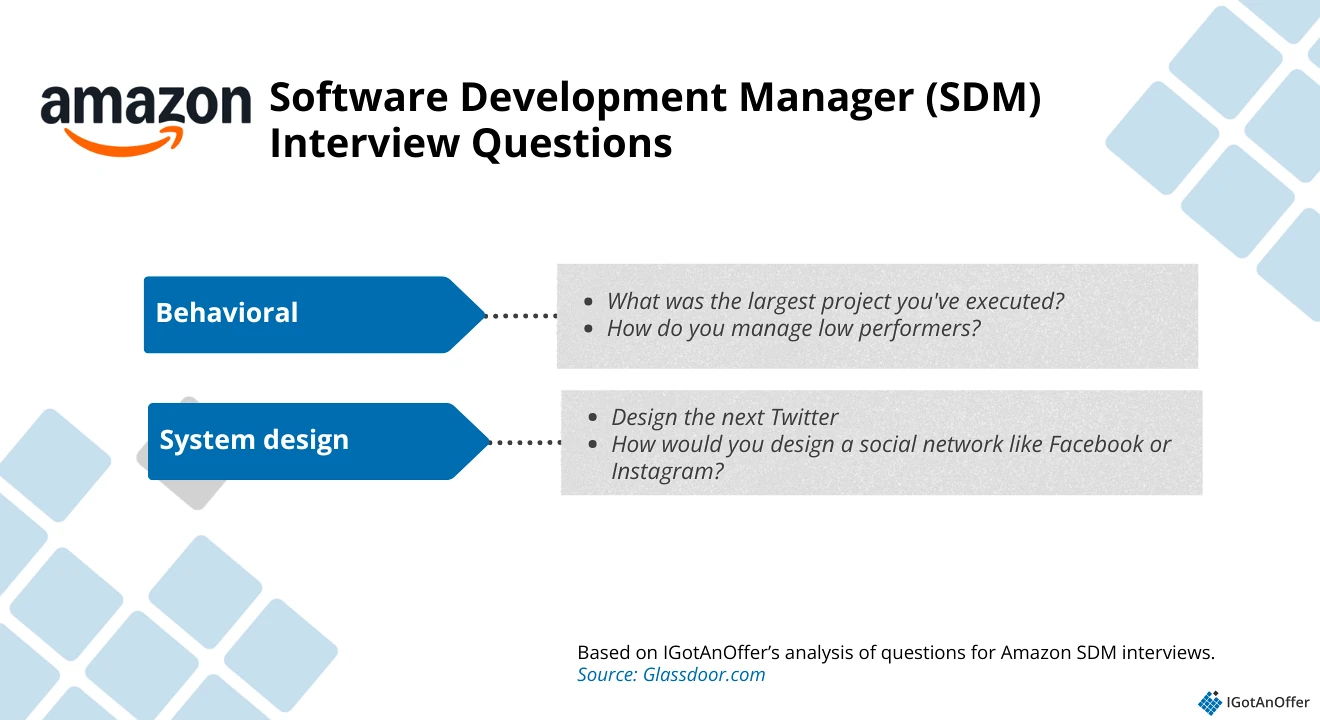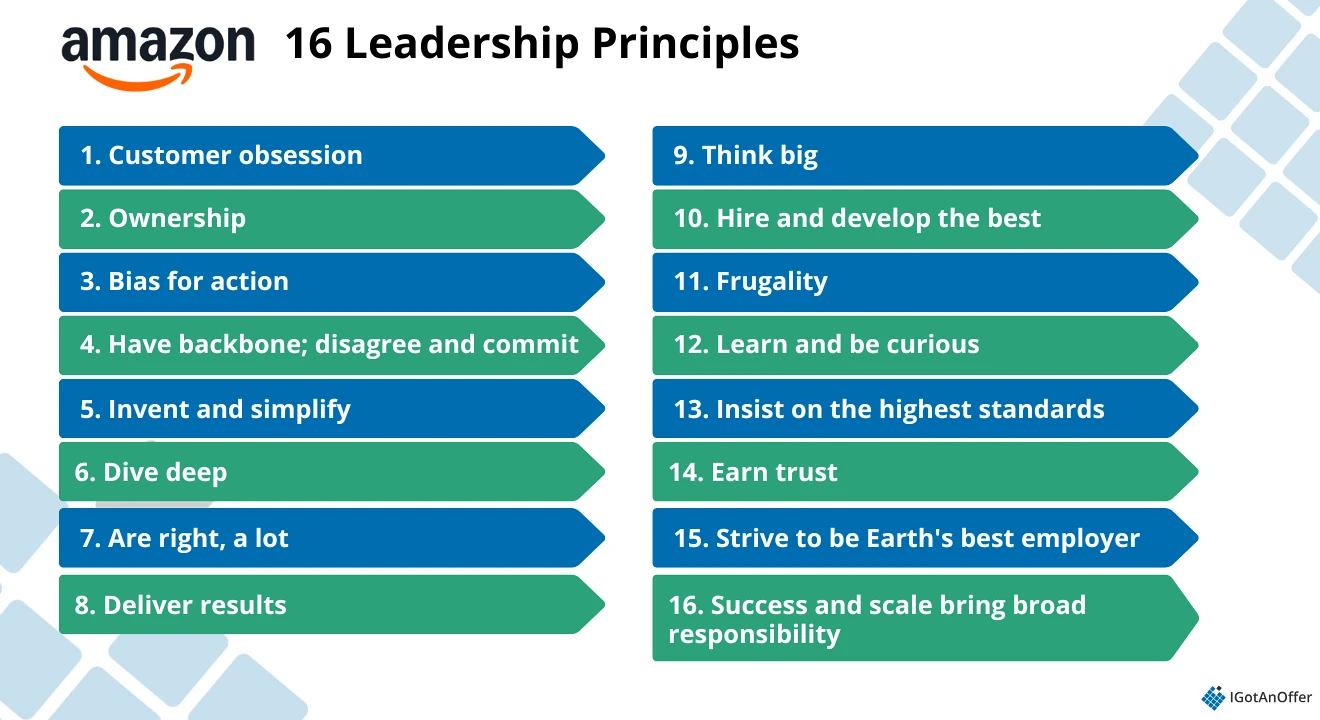Amazon software development manager (SDM) interviews are really challenging. The questions are difficult, specific to Amazon, and cover a wide range of topics.
The good news is that the right preparation can make a big difference and can help you land a job as an SDM at Amazon (or AWS). To help you get there, we have put together the ultimate guide below.
Here's an overview of what we'll cover:
Note: We've published guides for Amazon software development engineers (SDE, general) and Amazon SDE 2s. Check out those guides if they're more relevant to you.
Click here to practice mock interviews with ex-Amazon software development manager interviewers
1. Interview process and timeline

The Amazon software development manager interview process typically follows the steps below. Note that the process at AWS follows similar steps.
- Resume, cover letter, and referrals
- HR recruiter call
- Initial interview
- Onsite (five interviews)
This process usually takes 2-4 weeks to complete, but it can take 7+ weeks in some cases.
That's the high-level overview, but in order to prepare, you'll want to know more about what happens in each step. So let's dig into that now:
1.1 Resume, cover letter, and referrals
First, recruiters will look at your resume and assess if your experience matches the open position. This is the most competitive step in the process, as millions of candidates do not make it past this stage.
You can use this free guide to help tailor your resume to the position you’re targeting. To further polish your resume for Amazon, check out our Amazon resume guide.
And if you’re looking for expert feedback, you can also get input from our team of ex-Amazon recruiters, who will cover what achievements to focus on (or ignore), how to fine tune your bullet points, and more.
1.2 Recruiter call
Once your application is accepted, or if a recruiter reached out to you (for example, on LinkedIn) your next step will be a brief ~30-min call with a recruiter.
During this call, the recruiter will be looking to confirm that you've got a chance of getting the job at all. In order to do this, the recruiter will evaluate your "fit" with Amazon's culture, and your qualifications for the role that they're currently hiring.
You should be prepared for behavioral and resume questions like, "Tell me about yourself", "Why Amazon?", etc. You'll probably also want to be prepared to answer questions related to Amazon's 16 Leadership Principles. We'll dig deeper into behavioral questions and the Leadership Principles later in this guide.
If you get past this first HR screen, the recruiter will then help schedule your initial interview. And they may also send you some documents afterwards to help you prepare for the next interview.
1.3 Initial interview
Next up, you'll have a 1 hour interview with an Amazon manager (who is sometimes also the hiring manager for the role). This interview is usually focused on behavioral questions about your past management experience, and also questions related to Amazon's Leadership Principles.
Before this interview, it's a good idea to prepare some "stories" that highlight your past accomplishments and how you are aligned with the Leadership Principles (we'll cover this further in section 2 below).
There's also a chance that you'll be asked a system design question during this interview, although those are more prevalent in the onsite interviews. If you want to be on the safe-side, then start your preparation for system design questions early so that you'll have some practice in before this stage (more on system design questions in section 2 below).
1.4 Writing assignment
After the initial interview, some candidates will be asked to complete a writing assignment. Note that this only happens in some cases, so you may not have to complete this step.
If you are asked to do the writing assignment, you can expect to receive a prompt from Amazon with instructions. You'll usually be given a choice from a few topics. For example, you may be given a short list of questions, where you choose one and respond to it in writing.
If this and the previous steps have all gone well, then Amazon will invite you to the "onsite" interviews.
1.5 Onsite
The onsite interviews are the biggest test for Amazon SDM candidates. During this interview loop, you'll have 5 one-hour interviews, with several different interviewers from Amazon.
You'll mostly be interviewed by current software development managers. But, depending on the role and circumstances, you may have interviews with the hiring manager, an HR rep, and a senior executive called the Bar Raiser.
The interviews will be primarily focused on two types of questions: behavioral questions (often related to Amazon’s Leadership Principles) and system design questions. Some interviewers might still briefly test your coding skills, but this is extremely rare based on a sample of Glassdoor reports (<6% of candidates) and we therefore don’t recommend investing time in that area.
As an additional note, Amazon's interviews tend to be very structured, and your interviewer's may not engage in much dialogue with you. So, if you're used to having extensive back-and-forth discussion during interviews, try to prepare yourself mentally for this interview style. Try to focus on the questions that are being asked, so that you can deliver a clear and concise answer for each one.
[COVID Update] Given the Covid-19 pandemic, your onsite interviews with Amazon will likely be conducted virtually. You can ask your Amazon recruiter for the latest information on their Covid-19 adjustments.
2. Example questions
As we mentioned above, Amazon tends to ask two main types of questions during their software development manager interviews:

- Behavioral questions that assess your past experience and your management qualifications. These questions will often be specifically related to Amazon's Leadership Principles.
- System design questions that assess your technical knowledge, your thought process, and your knowledge of architecture and scaling.
In this section, we'll dig deeper into those two types of questions to give you a clearer idea of what to expect, and we'll also provide example questions that you can practice with. For even more practice, take a look at our list of 65 engineering manager interview questions.
All of the questions we'll list below are real Amazon SDM interview questions that were reported on Glassdoor. We've just categorized the questions, and we've changed the grammar and phrasing in some places to make the questions easier to understand.
Let's jump into the most common type of questions you'll face:
2.1 Behavioral (Amazon Leadership Principles) questions
Amazon’s software development manager interview process heavily focuses on assessing if you live and breathe the company’s 16 Leadership Principles. The main way Amazon tests this is with behavioral questions.
If you're not already familiar with Amazon's Leadership Principles, here is the full list:

- Customer Obsession - "Leaders start with the customer and work backwards. They work vigorously to earn and keep customer trust. Although leaders pay attention to competitors, they obsess over customers.”
- Ownership - "Leaders are owners. They think long term and don’t sacrifice long-term value for short-term results. They act on behalf of the entire company, beyond just their own team. They never say “that’s not my job.”
- Bias for Action - "Speed matters in business. Many decisions and actions are reversible and do not need extensive study. We value calculated risk taking.”
- Have Backbone; Disagree and Commit - "Leaders are obligated to respectfully challenge decisions when they disagree, even when doing so is uncomfortable or exhausting. Leaders have conviction and are tenacious. They do not compromise for the sake of social cohesion. Once a decision is determined, they commit wholly.”
- Invent and Simplify - "Leaders expect and require innovation and invention from their teams and always find ways to simplify. They are externally aware, look for new ideas from everywhere, and are not limited by “not invented here." Because we do new things, we accept that we may be misunderstood for long periods of time.”
- Dive Deep - "Leaders operate at all levels, stay connected to the details, audit frequently, and are skeptical when metrics and anecdote differ. No task is beneath them.”
- Are Right, A Lot - "Leaders are right a lot. They have strong judgement and good instincts. They seek diverse perspectives and work to disconfirm their beliefs.”
- Deliver Results - "Leaders focus on the key inputs for their business and deliver them with the right quality and in a timely fashion. Despite setbacks, they rise to the occasion and never settle.”
- Think Big - "Thinking small is a self-fulfilling prophecy. Leaders create and communicate a bold direction that inspires results. They think differently and look around corners for ways to serve customers.”
- Hire and Develop the Best - "Leaders raise the performance bar with every hire and promotion. They recognize exceptional talent, and willingly move them throughout the organization. Leaders develop leaders and take seriously their role in coaching others. We work on behalf of our people to invent mechanisms for development like Career Choice.”
- Frugality - "Accomplish more with less. Constraints breed resourcefulness, self-sufficiency, and invention. There are no extra points for growing headcount, budget size, or fixed expense.”
- Learn and Be Curious - "Leaders are never done learning and always seek to improve themselves. They are curious about new possibilities and act to explore them.”
- Insist on the Highest Standards - "Leaders have relentlessly high standards — many people may think these standards are unreasonably high. Leaders are continually raising the bar and drive their teams to deliver high quality products, services, and processes. Leaders ensure that defects do not get sent down the line and that problems are fixed so they stay fixed.”
- Earn Trust - "Leaders listen attentively, speak candidly, and treat others respectfully. They are vocally self-critical, even when doing so is awkward or embarrassing. Leaders do not believe their or their team’s body odour smells of perfume. They benchmark themselves and their teams against the best.”
- Strive to be Earth's Best Employer - "Leaders work every day to create a safer, more productive, higher performing, more diverse, and more just work environment. They lead with empathy, have fun at work, and make it easy for others to have fun. Leaders ask themselves: Are my fellow employees growing? Are they empowered? Are they ready for what's next? Leaders have a vision for and commitment to their employees' personal success, whether that be at Amazon or elsewhere."
- Success and Scale Bring Broad Responsibility - "We started in a garage, but we're not there anymore. We are big, we impact the world, and we are far from perfect. We must be humble and thoughtful about even the secondary effects of our actions. Our local communities, planet, and future generations need us to be better every day. We must begin each day with a determination to make better, do better, and be better for our customers, our employees, our partners, and the world at large. And we must end every day knowing we can do even more tomorrow. Leaders create more than they consume and always leave things better than how they found them."
As you prepare for your interviews, you'll want to be strategic about practicing "stories" from your past experiences that highlight how you've embodied each of the 16 principles listed above. We'll talk more about the strategy for doing this in section 3 below (the preparation section).
To help you start practicing, we've compiled the below list of SDM-specific questions from Glassdoor. These questions directly test your ability to lead engineering teams and handle challenging situations. We recommend that you practice each of them.
In addition, we also recommend practicing the behavioral questions in our Amazon SDE guide which cover a broader range of behavioral topics related to Amazon’s leadership principles.
Example behavioral questions asked by Amazon
- What do you do if you have to coach a staff member
- What was the largest project you've executed
- When was the last time you did something innovative?
- Tell me about a time you needed to deliver a project on a deadline but there were multiple roadblocks and constraints to deliver. How did you manage that situation?
- Give an example where you failed to do the right thing
- Give an example of how you helped another employee
- Tell me about a time you had a conflict with your supervisor and how you resolved it
- How do you manage low performers?
- Describe a time when a customer asked you for one thing, but you knew that they needed something else.
2.2 System design questions
Amazon products have millions of monthly active users. Amazon's SDMs therefore need to be able to design systems that are highly scalable. And this area is even more emphasized for engineering managers.
This is the part of the interview where you want to show that you can both be creative and structured at the same time.
Now here are several example system design questions you can practice with. If you need more practice, take a look at our list of 31 system design interview questions and Amazon system design interview guide.
Example system design questions asked at Amazon
- Design the next Twitter
- How would you design a social network like Facebook or Instagram?
- How would you design a system that reads book reviews from other sources and displays them on your online book store?
- How would you build the software behind an Amazon pick-up location with lockers?
- How do you handle calls between clients and REST API services with increased volumes?
- Design a promotion mechanism that could give 10% cash back on a particular credit card
- Design a short URL system
3. How to prepare
Now that you know what questions to expect, let's focus on how to prepare. Below is our four-step prep plan for Amazon, which also applies to Amazon Web Services. If you're preparing for more companies than just Amazon, then check our generic engineering manager preparation guide.
3.1 Learn about Amazon's culture
Most candidates fail to do this. But before investing tens of hours preparing for an interview at Amazon, you should take some time to make sure it's actually the right company for you.
Amazon is prestigious and it's tempting to assume that you should apply, without considering things more carefully. But, it's important to remember that the prestige of a job (by itself) won't make you happy in your day-to-day work. It's the type of work and the people you work with that will.
If you know engineers or managers who work at Amazon (or used to), talk to them to understand what the culture is like. The leadership principles we discussed above can give you a sense of what to expect, but there's no replacement for a conversation with an insider. Finally, we would also recommend the following resources:
- Amazon's technology culture video mix (by Amazon)
- Amazon vision and mission analysis (by Panmore Institute)
- Amazon strategy teardown (by CB Insights)
- Amazon salary negotiation (by IGotAnOffer)
3.2 Practice by yourself
As mentioned above, you'll have to answer two main types of questions during your interviews: behavioral and system design questions. The first step of your preparation should be to brush up on these different types of questions and to practice answering them by yourself, so let's take a look at how to do this.
3.2.1 Behavioral interview preparation
For answering behavioral interview questions, we recommend learning our step-by-step method. For Amazon, it's particularly important that you are able to demonstrate some of Amazon's Leadership Principles as you answer behavioral questions. And a great way to help you do this during your interviews, is to prepare several "stories" in advance.
When we say "story" all we really mean, is a scenario from your past work experience that you've outlined in advance, so that you can use it in your responses to interview questions. For example, maybe you were able to get a past project back on track after it fell behind on deadlines, that would be a great story for your interviews.
When you are preparing your stories, it's a good idea to refresh on the finer details of the project/situation to make sure you're ready to respond to any follow-up questions your interviewers might ask. You should also think about how you can summarize the main points of these experiences for your interviewers, so that you can communicate in a clear and concise way.
3.2.2 System design interview preparation
For system design interview questions, we recommend getting used to the step-by-step approach hinted at by Amazon in the video below.
Here is a summary of the approach:
- Step 1: Ask clarification questions
- Understand the goal of the system (e.g. sell ebooks)
- Establish the scope of the exercise (e.g. end-to-end experience, or just API?)
- Gather scale and performance requirements (e.g. 500 transactions per second)
- Mention any assumptions you're making out loud
- Step 2: Design at a high level then drill down
- Lay out the high level components (e.g. front-end, web servers, database)
- Drill down and design each component (e.g. front-end first)
- Start with the components you're most comfortable with (e.g. front-end if you're a front-end engineer)
- Work with your interviewer to provide the right level of detail
- Step 3: Bring it all together
- Refer back to the requirements to make sure your approach meets them
- Discuss any tradeoffs in the decisions you've made
- Summarize how the system would work end-to-end
We'd also recommend studying our system design interview questions and prep guide and learning how to answer system design interview questions. These guides cover a step-by-step method for answering system design questions, and they provide several example questions with solutions.
Once you’re in command of the subject matter, you’ll want to practice answering questions. But by yourself, you can’t simulate thinking on your feet or the pressure of performing in front of a stranger. Plus, there are no unexpected follow-up questions and no feedback.
That’s why many candidates try to practice with friends or peers.
3.3 Practice with peers
If you have friends or peers who can do mock interviews with you, that's an option worth trying. It’s free, but be warned, you may come up against the following problems:
- It’s hard to know if the feedback you get is accurate
- They’re unlikely to have insider knowledge of interviews at your target company
- On peer platforms, people often waste your time by not showing up
For those reasons, many candidates skip peer mock interviews and go straight to mock interviews with an expert.
3.4 Practice with experienced SWE interviewers
In our experience, practicing real interviews with experts who can give you company-specific feedback makes a huge difference.
Find an Amazon software engineer interview coach so you can:
- Test yourself under real interview conditions
- Get accurate feedback from a real expert
- Build your confidence
- Get company-specific insights
- Learn how to tell the right stories, better.
- Save time by focusing your preparation
Landing a job at a big tech company often results in a $50,000 per year or more increase in total compensation. In our experience, three or four coaching sessions worth ~$500 make a significant difference in your ability to land the job. That’s an ROI of 100x!














